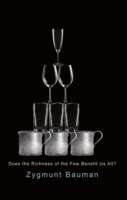Does the Richness of the Few Benefit Us All?

Editorial Polity
Fecha de edición junio 2013 · Edición nº 1
Idioma inglés
EAN 9780745671093
100 páginas
Libro
encuadernado en tapa blanda
Resumen del libro
It is commonly assumed that the best way to help the poor out of their misery is to allow the rich to get richer, that if the rich pay less taxes then all the rest of us will be better off, and that in the final analysis the richness of the few benefits us all. And yet these commonly held beliefs are flatly contradicted by our daily experience, an abundance of research findings and, indeed, logic. Such bizarre discrepancy between hard facts and popular opinions makes one pause and ask: why are these opinions so widespread and resistant to accumulated and fast-growing evidence to the contrary? This short book is by one of the world's leading social thinkers is an attempt to answer this question.
Bauman lists and scrutinizes the tacit assumptions and unreflected-upon convictions upon which such opinions are grounded, finding them one by one to be false, deceitful and misleading. Their persistence could be hardly sustainable were it not for the role they play in defending - indeed, promoting and reinforcing - the current, unprecedented, indefensible and still accelerating growth in social inequality and the rapidly widening gap between the elite of the rich and the rest of society.
Biografía del autor
Zygmunt Bauman nació en Poznan, Polonia, en 1925 y falleció en la ciudad inglesa de Leeds en 2017.<br> Tras la invasión nazi, su familia se refugió en la zona soviética y Bauman se alistó en el ejército polaco, que liberaría su país junto a las tropas soviéticas. Fue miembro del Partido Comunista hasta la represión antisemita de 1968; la consiguiente purga le obligó a abandonar su puesto como profesor de filosofía y sociología en la Universidad de Varsovia. Después enseñó sociología en Israel, Estados Unidos y Canadá, y fue profesor emérito en la Universidad de Leeds (Reino Unido).<br> En su abundante producción destacan libros fundamentales de la sociología contemporánea como Modernidad y holocausto o Modernidad líquida, o el volumen de conversaciones Vivir en tiempos turbulentos, donde nos brinda un acceso privilegiado a su pensamiento y a diversos aspectos clave de su vida. Zygmunt Bauman mereció el Premio Príncipe de Asturias de Comunicación y Humanidades 2010, el Premio Amalfi de Sociología y Ciencias Sociales (1992) y el Theodor W. Adorno (1998).








